北京地区成人本科学士学位英语统一考试
2014 年 11 月
Part I Reading Comprehension (30%)
Directions: There are three passages in this part. Each passage is followed by some
questions or unfinished statements. For each of them there are four choices marked
A, B, C and D. You should decide on the best choice and blacken the corresponding
letter on the Answer Sheet.
Passage 1
Questions 1 to 5 are based on the following passage:
Jarden Zinc (锌) Products, a large zinc plant a few miles outside Greeneville,
Tennessee, has a special claim. Since 1982, it has been the only supplier of penny
blanks for the U.S. Mint (铸币厂). It's a good business for Jarden-since 2000, the
company has earned more than $ 800 million. But it may not be a good deal for the
U.S.
(76) The value of the penny has been dropping for years. In 2006, it began to
cost more than a penny to make a penny. It now costs 2 C to produce a 1 C coin. Many
countries have stopped using pennies. Is it time for the U.S. to do the same?
Jarden and the zinc industry are fighting to keep the penny. Since 2006, Jarden
has given $1.2 million to Americans for Common Cents (ACC). The group's mission is
to keep the penny in use. Mark Weller is ACC's executive director. He argues that
there are three main reasons for keeping the penny: Without it, we would become more
reliant on the five-cent coin, which also has problems; charities (慈善机构) that
depend on penny drives would not be able to raise as much money; and a 2012 survey
shows that 67% of Americans want to keep the penny. (77) Many people surveyed said
they feared they would end up paying more for products.
Many experts disagree with ACC, They point to the dozens of countries that have
gotten rid of their lowest-value coins without raising prices for consumers. And
charities don't seem too concerned either.
President Barack Obama says the mint could explore using cheaper metals to make
pennies. Steel is less expensive than zinc. Pennies are 97.5% zinc and 2.5% copper.
But no matter what it is made of, the penny's days may be numbered. Most in-store
purchases are now made with credit cards, not cash. Is it time for a change?
1. what is the main idea of the passage?
A. Many countries are trying to reduce the cost of making coins.
B. These days a penny made is a penny wasted.
C. There is disagreement over whether the U.S. should stop using pennies.
D. Many countries have stopped using pennies.
2. The mission of ACC is to ______.
A. conduct online surveys
B. lower the production costs of the penny
C. raise money for charities
D. keep the penny in use
�
3. The penny coin is mainly made of _____.
A. copper
B. steel
C. iron
D. zinc
4. What does the sentence "the penny's days may be numbered" in the last paragraph
probably mean?
A. The penny may be out of use very soon.
B. The value of the penny may rise.
C. The penny has a special place in American history.
D. The penny is part of American culture.
5. According to the passage, which of the following statements is NOT TRUE?
A. Jarden is the sole supplier of the zinc the U.S. Mint uses to make the penny.
B. The majority of American people are in favor of keeping the penny.
C. Many Americans fear that getting rid of the penny would cause prices to rise.
D. The U.S. Mint now spends 2.4 cents to make a penny.
Passage 2
Questions 6 to 10 are based on the following passage:
Charles Dickens was born in 1812 in Portsmouth, England. He was the second of
eight children. His father always had problems with money. When Charles was 12 years
old, his father went to prison because he was in debt. Charles had to leave school
to help his family. He got a job in a dirty, old factory. Charles Dickens never forgot
his difficult childhood. Many of his stories and books were about poor people and
their problems.
(78) Later, Charles went back to school for two more years. He left school when
he was 15 years old to become a newspaper reporter. In 1836, he began to write The
Pickwick Papers. It was published as a series and was a huge success. By age 24,
Dickens was a prominent writer in both Great Britain and the United States.
Many people bought his books, but they also paid to hear him read his stories
aloud. Because there was no radio or television, people liked to hear famous writers
read in public. Dickens read his works like he was acting in a play. He went on very
successful reading tours and earned a lot of money.
Dickens was meticulous (过分注意琐事的). Everything had to be just right. When
he worked at home, everything had to be in its place. He worked at a desk by a window
that always had a vase (花瓶) of flowers and the same ornaments (装饰物) on it. (79)
He wrote 2, 000 words a day and he required complete quiet while he wrote. He divided
his page into three parts, and on each side he had notes in difficult colors. The
main writing was in middle, the story notes were in the right margin, and the chapter
notes were in the left margin. He also cared a lot about his appearance.
6. Charles Dickens' father was put into prison because he
.
A. stole money from other people
B. refused to pay tax
C. didn't pay for his children's education
�
D. owed money to other people
7. According to the passage, which of the following is TRUE ?
A. Dickens loved to travel.
B. Dickens' stories were mostly about his own childhood.
C. Dickens made a lot of money on his reading tours.
D. Dickens left school to write The Pickwick Papers.
8. According to the passage, which of the following about Dickens is TRUE ?
A. He was a peaceful person.
B. He was a quiet writer.
C. He worked very hard at school.
D. He cared a lot about things around him.
9. The word “prominent” in the second paragraph means________ .
A. Famous
B. Thoughtful
C. Careful
D. difficult
After
10.
Dickens'
the
last
.
A. Success
B. Appearance
C. Works
D. childhood
paragraph,
the
author
will
most
probably
discuss
Passage 3
Questions 11 to 15 are based on the following passage:
Computer technology is advancing so fast that old hardware quickly becomes
completely obsolete. The electronic waster (e-waste) from this constantly growing
field is polluting the environment, both here and abroad.
Computers contain toxic (有毒的) materials such as lead. Despite the danger of
throwing these hazardous materials in a landfill (垃圾填埋场), that's exactly where
tons of computers end up. Americans reuse or recycle only about 10 percent of the
50 million computers they replace each year, according to ABC News. Eighty percent
is being stockpiled (囤积), which could create even bigger problems in the future,
and the remaining 10 percent is landfilled. Throwing e-waste in landfills creates
a potential for landfills are tougher in the United States than in many other
countries, e-waste is often exported, especially to some developing countries.
(80) Some countries are creating policies to deal with the growing e-waste
problem. In the Netherlands, you can bring your old computer to the seller when buying
a new one, and the seller must by law accept it free of charge. Japan passed a law
in 2001 requiring producers to recycle certain parts.
In the united states, a movement called the Computer TakeBack Campaign is
demanding that producers take more responsibility for disposing of (处理) old
computers, California and Massachusetts recently prohibited certain computer parts
in landfills, while Apple and IBM take back computers for about a $30 fee. Gateway
�
is one step ahead: They will pay you $50 for recycling your old computer when you
buy a new one from them. Lastly, many nonprofit programs accept used equipment, and
services have popped up that distribute old computers to schools and other
organizations.
11. Which of the following is the best title for the passage?
A. The Main Exports of America
B. The Computer TakeBack Campaign
C. The Harm of E-waste Treatment
D. Electronic Waste-a Global Problem
12. What does the word “obsolete” in the first paragraph probably mean?
A. Fashionable.
B. Useful.
C. Out of date.
D. Out of control.
13. Americans reuse about______ million computers each year.
A. 5
B. 10
C. 15
D. 20
14. According to the passage, American electronic waste is exported to other
countries because these countries have_______.
A. the resources and more space to process the e-waste
B. less strictly enforced environment safety standards
C. a lot of skilled e-waste workers
D. many computer recycling businesses
15. According to the passage, which of the following statements is TRUE?
A. Japan passed a law to address the e-waste problem.
B. Compared with stockpile, landfill is a better and safer method to deal with
e-waste.
C. Apple will pay you $50 for recycling your old computer when you buy a new one
from them.
D. Old computers are safe to the environment even when improperly disposed of.
Part II Vocabulary and Structure (30%)
Directions:
In this part there are 30 incomplete sentences. For each sentence there
are four choices marked A, B, C and D. Choose the ONE answer that best completes
the sentence. Then blacken the Corresponding letter on the Answer Sheet.
16. The fried fish we ate at the restaurant yesterday is delicious. I'd like to have
it again even if it costs____.
A. as twice much
B. twice as much
C. much as twice
D. as much twice
17. ____too much to do, they have to keep themselves busy all day long.
A. Having
B. Have
C. Had
D. Being
18. Air pollution, together with overpopulation, ____ many problems in big cities.
D. is caused
19. She has no idea of what the book is about. She ____ have read it carefully.
A. are causing
B. is causing
C. are caused
A. mustn’t
B. can't
C. shouldn't
D. needn't
20. ____ from space, our earth, with water covering 70% of its surface, appears as
�
a "blue planet".
A. Seeing
B. To be seen
C. Seen
D. Having seen
21. The mere fact____ most people believe a nuclear war would be mad does not mean
that it will not occur.
A. what
B. which
C. that
D. why
22. It was____ he had made such great contributions to world peace that he won the
Nobel Prize for Peace.
A. that
B. because
C. how
D. why
23. If it ____tomorrow, we won't go for a picnic.
A. Will rain
C. rains
24. The number of members in the club____ to two hundred.
B. should rain
D. rained
A. were limited
B. limits
C. was limited
D. limited
25. There are many fashion shops and expensive restaurants on ____ sides of the
street.
A. all
B, each
C, both
D.every
26. I went to____ London yesterday and saw ____strange old man and a little girl,
begging by the roadside.
A. /; a
B. a; /
C. /; the
D .the; /
27. John, let's take a taxi, _____?
A. Will you
B. Shall we
C. would you
D. should we
28. Of all the girls in the class Jane studies the____ .
A. hard
B. harder
C. hardest
D. hardly
29. Do you know the girl ____father died in a car accident last week?
A. who
B. that
C. whom
D. whose
30. When the violinist finished his performance, the audience stood up and ____for
five minutes.
A. acted
B. clapped
C. backed
D. closed
31. She doesn't want to listen to you now; she has something urgent to____.
A. talk with
B. laugh at
C. cope with
D. warm up
32. I can't find my keys! Can you help me ____ them?
A. dream about
B. look for
C. see through
D. speak of
33. A: ____ Madam, Is there a post office near here?
B: Keep on going ahead. Turn right at the first crossroads. Then you'll find one
there.
A. Sorry
D. Thanks a lot
34. The American couple have____ a two-year-old child, who lost his parents in an
earthquake.
B. You are welcome
C. Excuse me
A. adjusted
B. afforded
C. approved
D. adopted
35. You should be ____ of yourself, telling lies at your age.
A. ashamed
B. accurate
C. adequate
D.attractive
36. No sooner had he sat down to lunch ____there was a knock at the door.
A. when
B. that
C. as
D. than
37. This kind of computer is____. handling all kinds of information.
A. capable to
B. able to
C. capable of
D. able of
�
38. Please sit down and make yourself____.
A. in the room
D. at home
39. He offered to ____her a hand as the suitcase was too heavy for her to carry.
B. fine
C. easy
A. borrow
B. help
C. lend
D. show
40. Don't let the child play with scissors ____he cuts himself.
A. in case
B. so that
C. now that
D. only if
41. Let me give you a ____ of how the computer works.
A. demonstration
D. distinction
42. ________ the rain, we would have had a pleasant trip to the countryside.
B. difference
C. deduction
A. Because of
B. Due to
C. Thanks to
D. But for
43. The textbook is for the ____ students, not for the beginners.
A. foreign
B. blind
C. advanced
D. deaf
44. By the end of next month he ____ everything in school.
A. will finish
B. would have finished
C. finishes
D. will have
finished
45. Sam: I don't drink coffee at all.
Frank: ____ .
A. So don't I
B. I do either
C. Nor I do
D. Neither do I
Part III Identification (10%)
Directions: Each of the following sentences has four underlined parts marked A, B,
C and D. Identify the one that is not correct. Then blacken the corresponding letter
on the Answer Sheet.
46. Should she come tomorrow, I will take her to the museum.
A
B
C
D
47. Only in this way we can wipe out the enemy troops.
A
B
C
D
48. In fact I would rather leave for San Francisco than staying in Los Angeles.
A
B
C
D
49. Next weekend he will visit the airport which he worked 30 years ago.
A
B
C
D
50. Since it's raining hard now we had better to put off our sports meet till next
week.
A
B
C
D
51. Though Jane tried her best this time, but she still failed in the math exam.
A
B
C
D
52. The next morning the first thing my brother and me did was to go out for a walk
in the forest.
A
B
C
D
53. The little boy runs very faster than most of his classmates in the school.
A
B
C
D
54. She liked her job as a waitress because she enjoyed to meet people.
A
B
C
D
55. There are many children and adults whom behavior is generally unacceptable.
A
B
C
D
�
Part IV Cloze (10%)
Directions: There are 20 blanks in the following passage, and for each blank there
are 4 choices marked A, B, C and D at the end of the passage. You should choose ONE
answer that best fits into the passage. Then blacken the corresponding letter on
the Answer Sheet.
I have a friend who put her career on hold after she got married and had children.
She stayed at home until the oldest was four years old, 56 she began doing part-time
jobs to get out of the house. That wasn't enough, so she took a full-time job, which
57 her to travel. She was making more money than her husband, even 58 four years
off the market. Her in-laws, who believe a woman's only function is housekeeping,
59 to her husband with their negative opinions. Emotionally torn (受折磨的), he
wanted to 60 his wife but was conditioned by loyalty (忠诚) to his parents' ideals.
Naturally, his wife also felt 61, eager to purse her vision but emotionally invested
in her husband and family.
I 62 her to go with her vision, because it's her life. Too many women give up
their career dreams to 63 a relationship. That's traditional, but it can 64 you crazy.
And some dreams, if you don't purse them in time, will pass you 65 . When you're
finally free to go 66 them, you've 67 the window of opportunity. After further
discussion, her husband went along, 68 he valued the relationship as much as she
did.
Conversely (相反地) , a former student, whose husband felt 69 by her earning
more money than he did, ended her 70 consulting practice and gave up a six-figure
income. To 71 conflict in her relationship, she abandoned her passion. Maybe she
should have abandoned her husband's 72 thinking and surrounded herself instead with
people who believed in her.
B. where
C. which
D. when
A relationship must be mutually 73, and any genuine relationship will adjust
to change. When you recognize that a relationship is putting out your fire, ask
yourself 74 you should gracefully go away and realize your dreams. Communicate how
much your vision means to you, do it in a relationship-friendly 75 , and the people
in your life will surprise you.
56. A. what
57. A. requested
58. A. beside
59. A. complained
60. A. separate
61. A. relieved
62. A. objected
63. A. protect
64. A. do
65. A. in
66. A. among
67. A. missed
68. A. although
69. A. conquered
B. aroused
B. after
B. governed
B. guarantee
B. confirmed
B. encouraged
B. destroy
C. quarreled
C. support
C. resolved
C. perceived
C. provide
D. conflicted
D. released
D. resemble
C. before
C. received
C. because
B. threatened
C. transformed
D. assured
D. provided
D. before
D. sympathized
B. through
B. acquired
B. while
D. after
D. forgot
D. however
B. drive
B. out
C. look
C. by
D. find
D. off
C. required
C. beyond
D. oppose
�
70. A. successful
71. A. explore
72. A. enforced
73. A. logical
74. A. whether
75. A. path
B. thoughtful
C. revolutionary
D. primitive
B. defeat
B. limited
C. approach
C. ventured
D. avoid
D. extended
B. successive
C. beneficial
D. synthetic
B. where
B. route
C. how
C. road
D. which
D. way
Part V Translation (20%)
Section A
Directions: In this part there are five sentences which you should translate into
Chinese. These sentences are all taken from the 3 passages you have just read in
Reading Comprehension. You can refer back to the passages to identify their meanings
in the context.
76. The value of the penny has been dropping for year.
77. Many people survey said they feared they would end up paying more for products.
78. Later, Charles went back to school for two more years.
79. He wrote 2, 000 words a day and he required complete quiet while he wrote.
80. Some countries are creating policies to deal with the growing e-waste problem.
Section B
Directions: In this part there are five sentences in Chinese. You should translate
them into English. Be sure to write clearly.
81.这些人急需食物和水。
82.我相信你是班上最棒的。
83.玛丽一回来,我就会把信给她的。
84.众所周知,吸烟有害健康。
85.在你考虑之后,请告诉我你的决定。
�
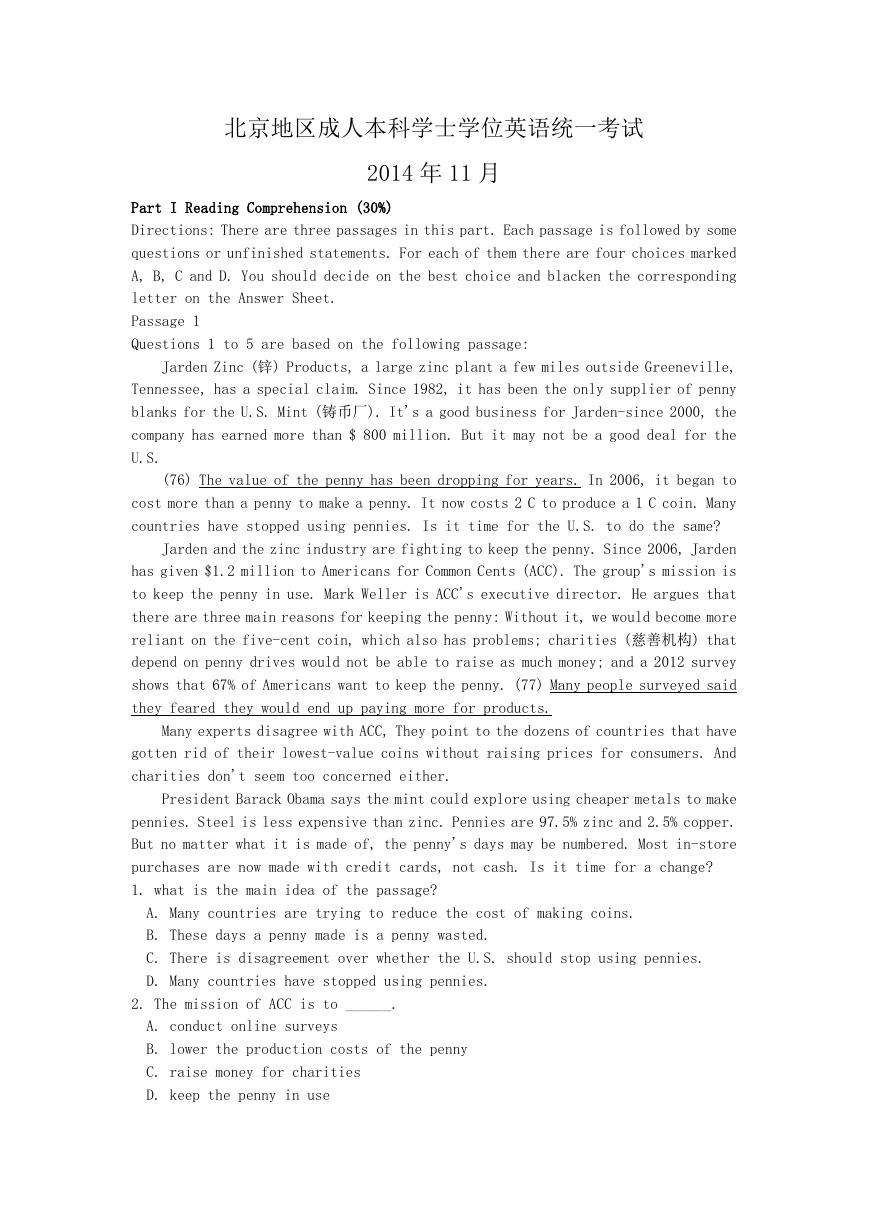
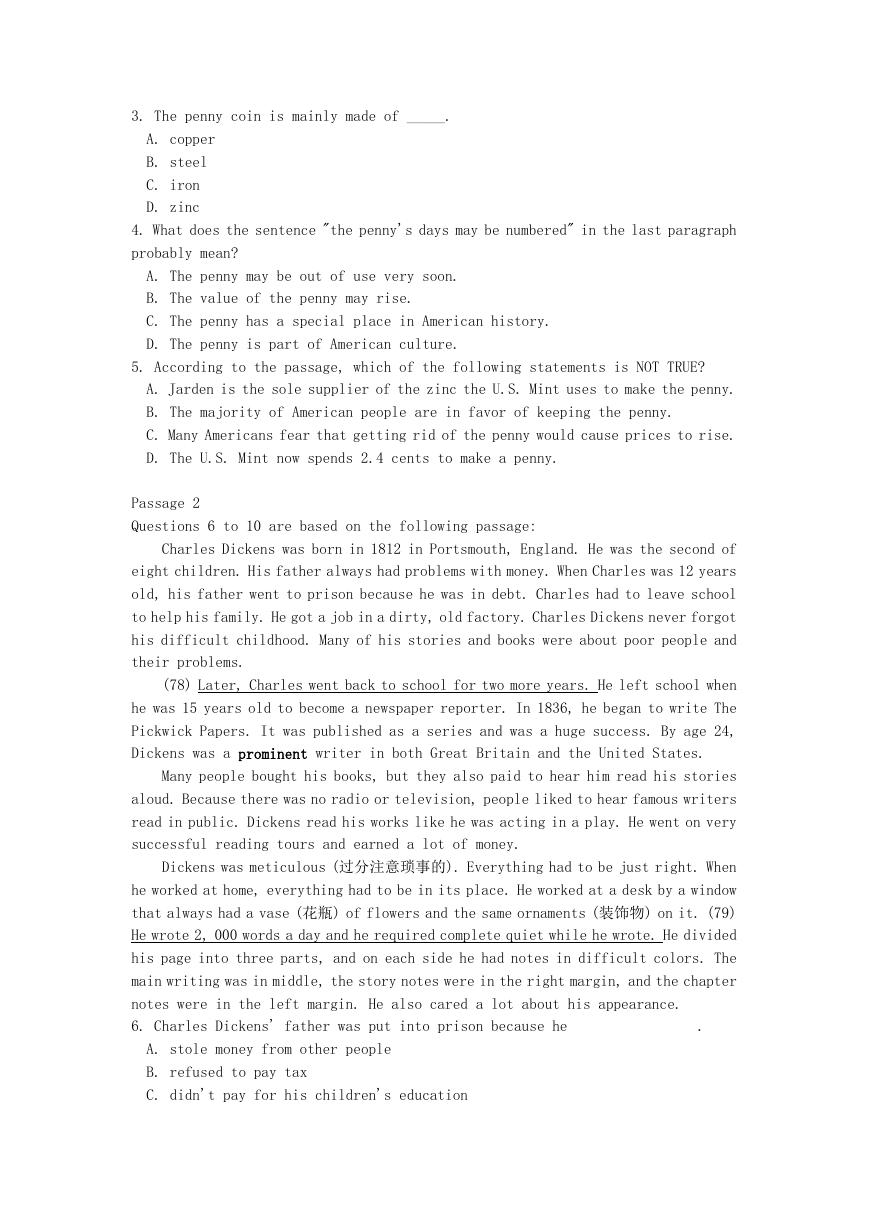
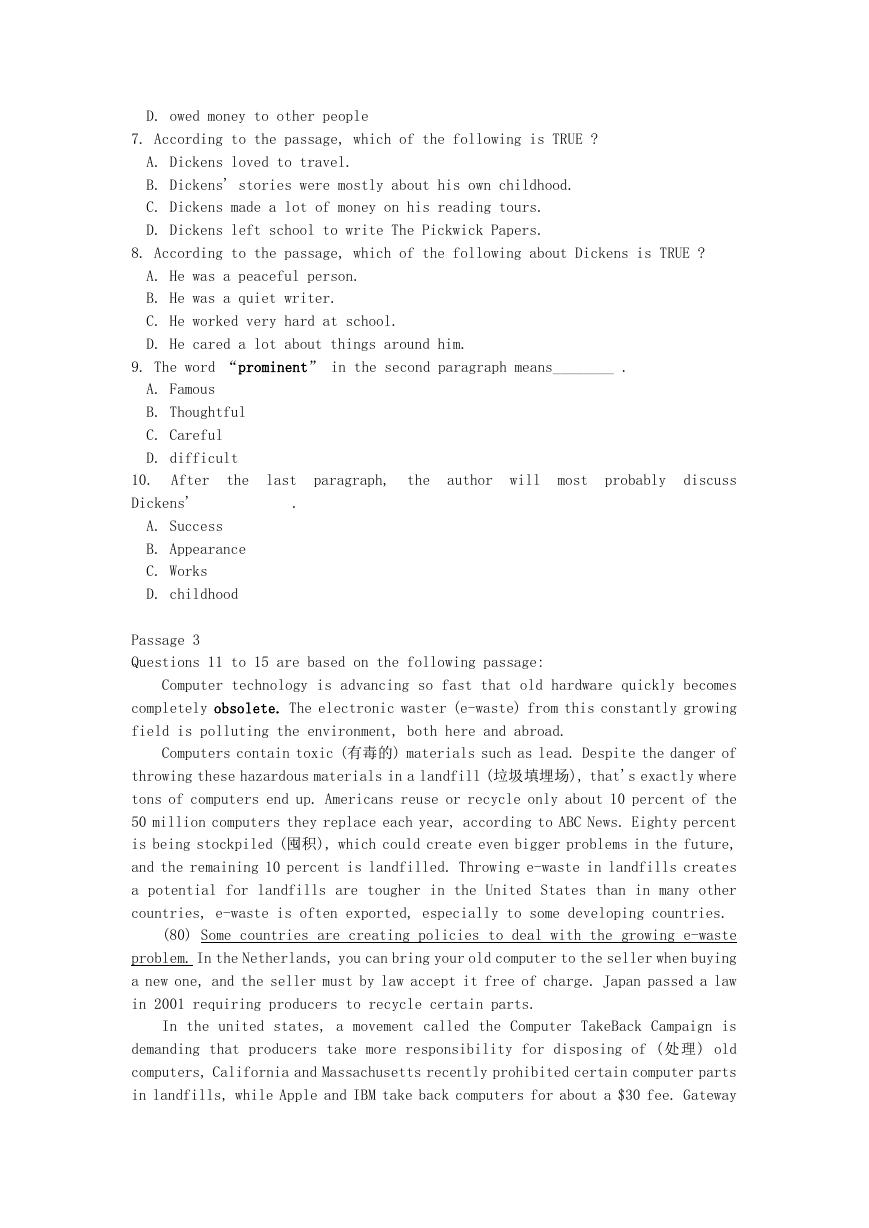
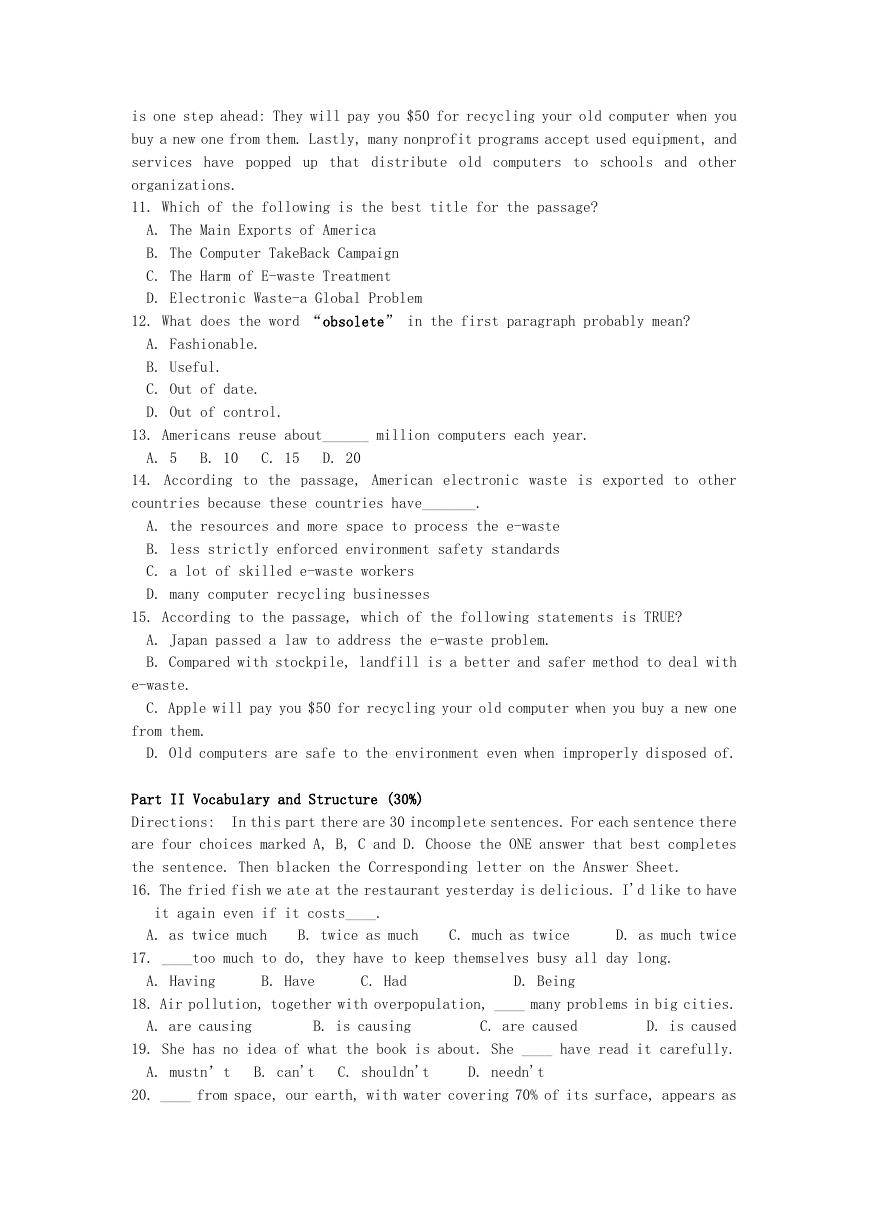
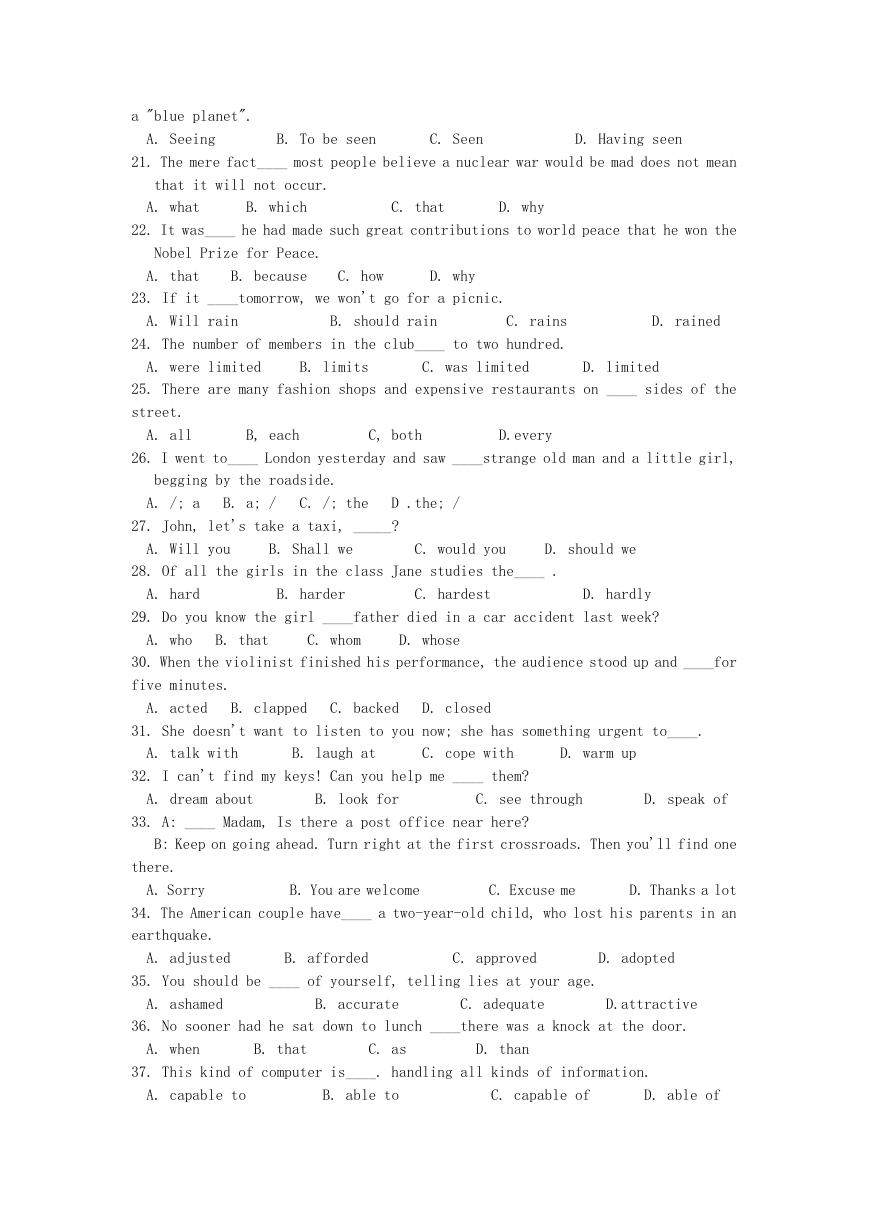
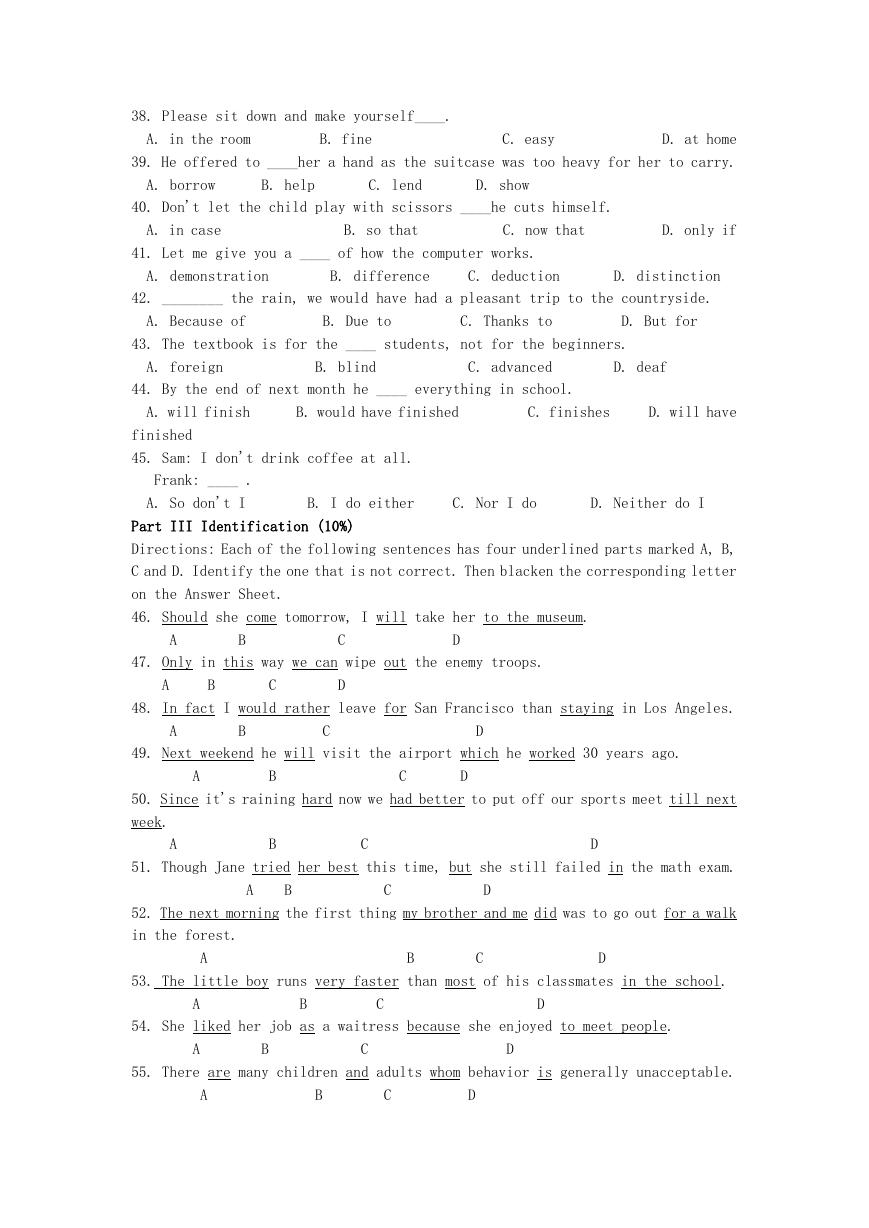
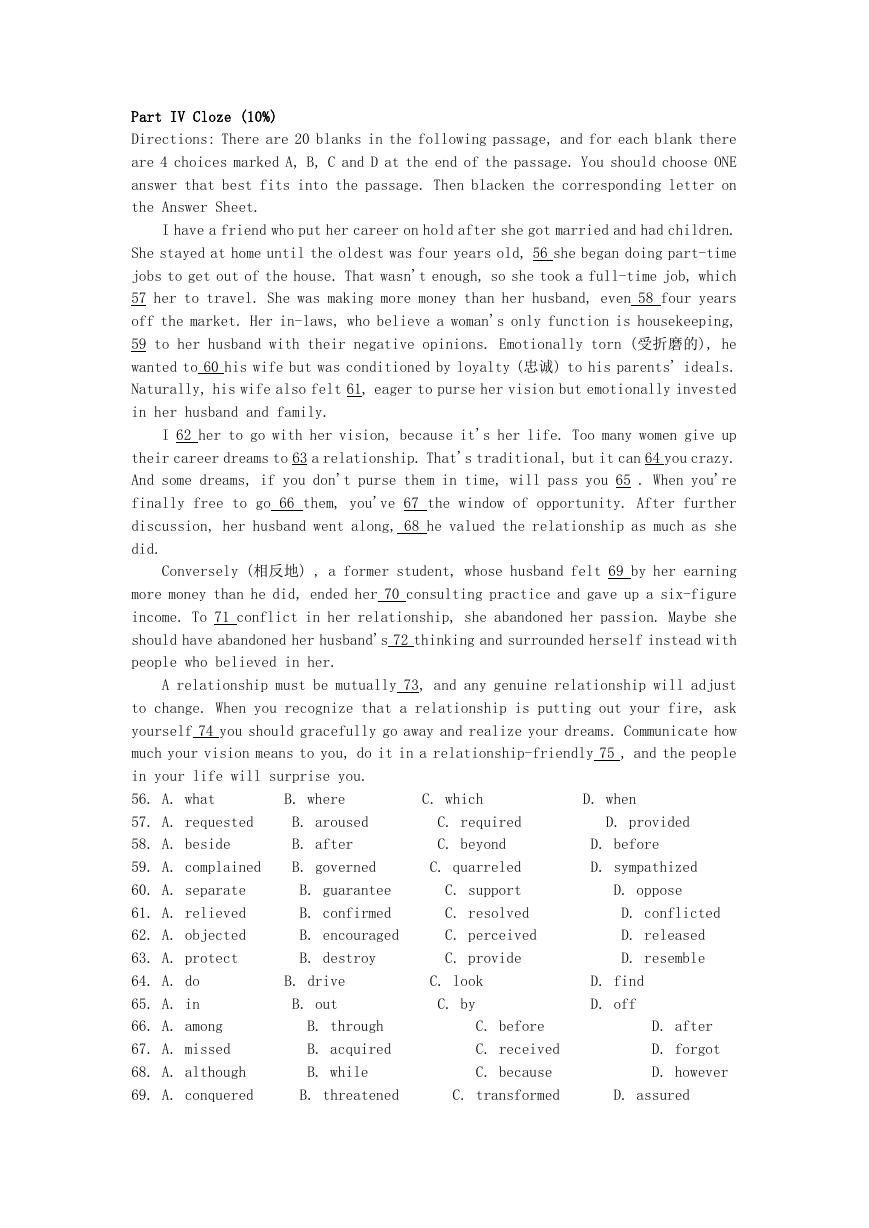
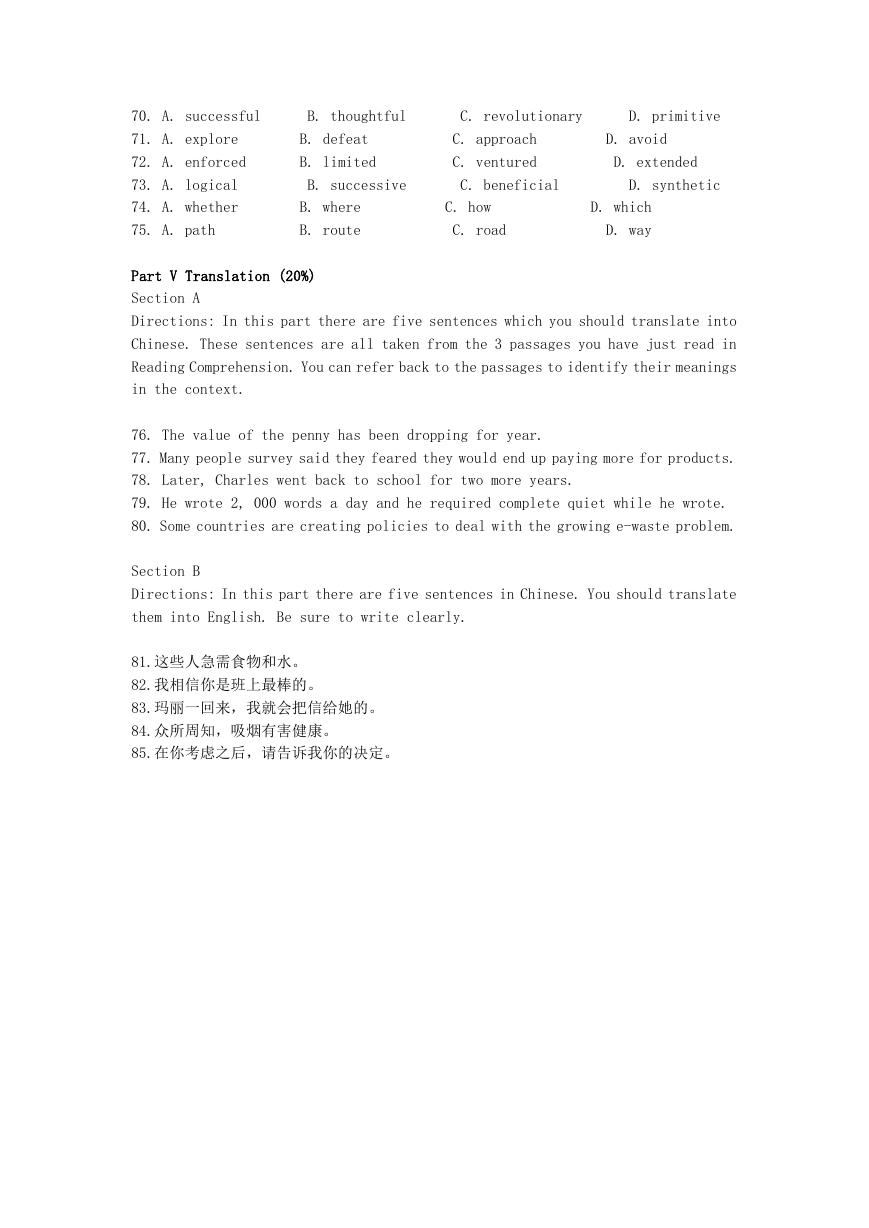








 2023年江西萍乡中考道德与法治真题及答案.doc
2023年江西萍乡中考道德与法治真题及答案.doc 2012年重庆南川中考生物真题及答案.doc
2012年重庆南川中考生物真题及答案.doc 2013年江西师范大学地理学综合及文艺理论基础考研真题.doc
2013年江西师范大学地理学综合及文艺理论基础考研真题.doc 2020年四川甘孜小升初语文真题及答案I卷.doc
2020年四川甘孜小升初语文真题及答案I卷.doc 2020年注册岩土工程师专业基础考试真题及答案.doc
2020年注册岩土工程师专业基础考试真题及答案.doc 2023-2024学年福建省厦门市九年级上学期数学月考试题及答案.doc
2023-2024学年福建省厦门市九年级上学期数学月考试题及答案.doc 2021-2022学年辽宁省沈阳市大东区九年级上学期语文期末试题及答案.doc
2021-2022学年辽宁省沈阳市大东区九年级上学期语文期末试题及答案.doc 2022-2023学年北京东城区初三第一学期物理期末试卷及答案.doc
2022-2023学年北京东城区初三第一学期物理期末试卷及答案.doc 2018上半年江西教师资格初中地理学科知识与教学能力真题及答案.doc
2018上半年江西教师资格初中地理学科知识与教学能力真题及答案.doc 2012年河北国家公务员申论考试真题及答案-省级.doc
2012年河北国家公务员申论考试真题及答案-省级.doc 2020-2021学年江苏省扬州市江都区邵樊片九年级上学期数学第一次质量检测试题及答案.doc
2020-2021学年江苏省扬州市江都区邵樊片九年级上学期数学第一次质量检测试题及答案.doc 2022下半年黑龙江教师资格证中学综合素质真题及答案.doc
2022下半年黑龙江教师资格证中学综合素质真题及答案.doc